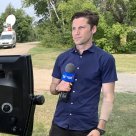Kiyari McNab and David Kelly set up camp along the Canadian Pacific Rail tracks in Saskatoon on Saturday afternoon to demonstrate their support for the Wet’suwet’en hereditary chiefs against the construction of the LNG Coastal GasLink pipeline.

They haven’t left.
For three days, McNab and Kelly have remained at the camp, which is on CP property but not on the tracks. They eat their meals by a fire and sleep in a tent just metres away from where trains pass, albeit slowly.
Other demonstrators come and go, often bringing supplies and watching over them as they sleep, but McNab and Kelly are two constants at the camp. They greet others as they arrive and have earned the respect of demonstrators more than three times their age.
They’re both 19 years old.
“Youth have powerful voices, so I think it’s a big, important thing that youth are involved and that we stay involved,” McNab said. “We’re fighting for our future generations and our future children and we got to keep our old ways.”
“We just want to be heard, we want our land to be saved,” Kelly said as a train passed.
- Can you tell fake alcohol from real? Why methanol is so hard to detect
- Halifax Walmart death: Store will not reopen for ‘weeks’ as remodelling continues
- Will Canada’s tax ‘holiday’ create a ‘mess’ for businesses? Some say yes
- Alberta seeks to ‘de-risk’ oil, gas pipeline investments in wake of Trump victory
They met and became friends in foster care. Now both are disrupting rail traffic as part of ongoing demonstrations across Canada.
Blockades were erected across the country in early February to show solidarity with the Wet’suwet’en hereditary chiefs who oppose the GasLink pipeline scheduled to be built through traditional territory. Last Friday, Prime Minister Justin Trudeau said the blockades should be removed, but few have been.

Get daily National news
Less than a day after Trudeau’s announcement, demonstrators in Saskatoon began camping on CP property in the middle of the city, between 21st Street and 22nd Street.
Darrell Bourassa has been at the site since Saturday afternoon but leaves in the evenings and returns the next day. He told Global News he took part in the Standing Rock protests in North Dakota in 2018, and that he was part of the Oka Crisis in Quebec in 1990. He said he’s been tear-gassed three times and pepper-sprayed once.
He said he finds McNab and Kelly inspiring.
“They’re pillars of our young community. They’re willing to take a stand with our brothers and sisters and … it’s really good to see,” he told Global News. “The difference is that now (demonstrations are) more accepted. People are willing to stop and listen to the message.”
One such person was Darius Siminot, who brought his infant son Van to the camp.
“I wanted to educate my son about this issue,” he said, holding Van in his arms next to the empty tracks.
He said he hoped Van would learn “there were people on this land before settler people were ever here and their voices need to be heard.”
Rodolfo Pina, a sessional lecturer at the First Nations University of Canada, also briefly visited the camp and address the roughly 20 people there. He brought an Aymara flag to represent the South American Indigenous people who live in the Andes.
Pina, who is Aymara and said he was also in the Oka crisis, told Global News he was there to show solidarity.
“I came here because I think it’s so important that, as a society, Canada begins to understand that we really need to work together,” he said.
“I know there’s tremendous misunderstanding in many things but yet there are ways and there are moments when people have to start really talking. Otherwise, it’s going to blow.”
Bourassa said he respected the peaceful resistance in which McNab and Kelly are participating.
McNab said even a personal request from the prime minister wouldn’t be able to move them.
“If he wants us to take it down he has to come out here and tell us himself,” she said.
“But that’s also not up to us.”
Erica Violet Lee, an organizer, told Global News that she is in contact with blockade leaders in B.C.
“We’re not moving, we’re going to stay until Wet’suwet’en gives us the go-ahead,” Kelly said.
Canadian Pacific has not responded to requests for comment.








Comments